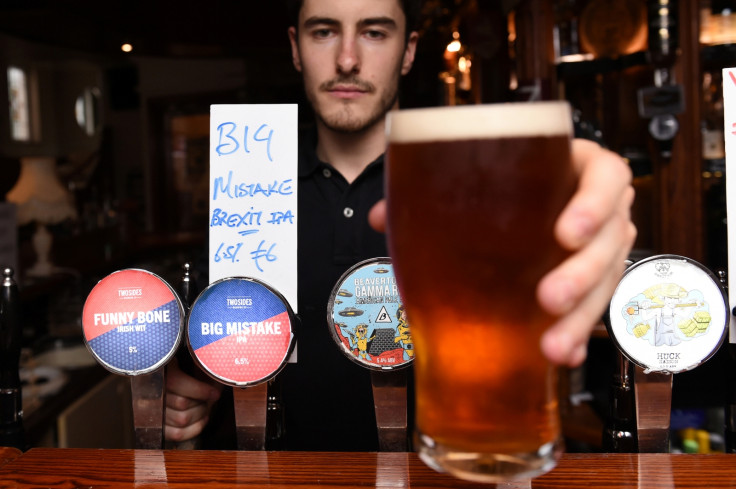Ireland has many reasons to distrust the EU - but we have been stunned by Britain's decision to leave
Irish voters have taken out their anger with Brussels at the ballot box rather than through referendums.
The Republic of Ireland joined the European Economic Community (EEC) on 1 January 1973, the same day as the United Kingdom, but for entirely different reasons. For the Republic, barely a nation for 50 years, the pooling of sovereignty occasioned by membership of this supranational organisation was paradoxically an expression of independence. An independent Ireland now had the power to make those decisions.
Britain on the other hand has always had an ambivalent attitude at best, and downright hostile stance toward Europe at worst. For the UK, joining the EEC was a matter of economic expediency, not sovereignty.
On a train to Sligo recently, I overheard a retired academic and a priest discussing the volatile state of the world. They concluded the Americans might be mad enough to vote for Donald Trump, but the British were ultimately a sensible people not prone to gusts of raw emotion nor prey to the fulminations of charlatans and populists.
Therefore, these gentlemen concluded that despite their demonstrable lack of affection for the European Union, the British would not leave.
That complacency became infectious and pervaded right up until the result seeped out in the early hours of Friday morning. Irish people know Britain much better than British people know Ireland. British media is ubiquitous. Many friends heard the exit poll and Nigel Farage's concession on Sky News shortly after the polls closed.
They went to bed content that the status quo had been preserved. The British would grumble about Europe. They always do, but they would not be mad enough to give up EU membership. The Irish public woke up to be stunned by the British decision.
The Irish have had referenda on Europe since the first one to join in 1972, in which 83.1% voted in favour. Occasionally, the electorate has given the EU a bloody nose, rejecting the Nice and Lisbon treaties, before voting again having winkled out significant concessions.
Yet it is highly unlikely, if given a chance, that they would take the same decision as the British. There is no Eurosceptic media in Ireland like there is in Britain and the major parties are all supporters of the European Union.

If ever a country had a gripe against the European Union, it would be Ireland. The export-led Celtic Tiger of the late 1990s was washed away in a tsunami of cheap money occasioned by Ireland's decision to join the single currency.
The Irish banks borrowed vast sums from their European counterparts and spent it on the biggest property bubble per capita in history. The bank bailout of 2010 was the ultimate humiliation.
"Was it for this?" The Irish Times editorial of November 18, 2010 opined, echoing the poet WB Yeat's sentiments about how Ireland had failed to live up to the ideals of the patriot dead, "a bailout from the German chancellor with a few shillings of sympathy from the British chancellor on the side. There is the shame of it all."
A day after the EU vote, the Irish passport office in Belfast ran out of forms.
The Irish were not allowed to burn the senior bondholders of European banks and have carried a disproportionate share of EU bank debt ever since. Yet, the response to this fury has been to take it out at the ballot box against successive Irish governments, not the EU.
I come from County Leitrim, a border county. For decades during the Troubles, many border roads were closed, cutting off so many border communities from their natural hinterland. Those borders have been removed. It is unthinkable that they would be restored, yet that scenario is now a distinct possibility. How can the UK control its borders if it cannot control the one land border it has with the EU?
Sinn Féin called immediately for a border poll, but this is mischief making. There is no desire either north or south, outside republican circles, for such a poll. The situation is much too volatile.
For centuries there has been free and easy movement of people between Britain and Ireland. The Irish community in Britain is 400,000 strong, long established and very visible. Less well known is that there are 112,000 British nationals living in Ireland, proportionately more of the population.
What is certain is that there will be a stampede for Irish passports from those who can get one, which confers all the benefits of being an EU citizen. A day after the vote, the Irish passport office in Belfast ran out of forms.
DUP MP Ian Paisley Jr said he was willing to sign Irish passport forms for any of those in his staunchly Unionist constituency who want one. His father Ian Paisley Snr would be turning in his graves. We live in very strange times.
Ronan McGreevy is a journalist and videographer with The Irish Times. He is the author of Wherever the Firing Line Extends: Ireland and the Western Front which is being published on 1 July. He is the editor of Was it for This? Reflections on the Easter Rising published earlier this year.
© Copyright IBTimes 2025. All rights reserved.






















